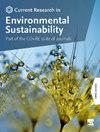Conservation education for sustainable development through field internship at NGOs
IF 3.8
Q2 ENVIRONMENTAL SCIENCES
Current Research in Environmental Sustainability
Pub Date : 2025-01-01
DOI:10.1016/j.crsust.2024.100278
引用次数: 0
Abstract
Conservation is necessary to achieve sustainable development, and building capacity of youth and having them participate in conservation is an urgent imperative. The SATO-YAMA-UMI Project was a conservation project operated in six countries in the Asia-Pacific region. The project conducted an internship program for Japanese youth in fiscal year 2018–2019, whose impacts were assessed by members of implementing organizations and former interns in 2024 through online questionnaire and a focus group discussion. The assessment sought answers to: What are the benefits of on-site internship, as opposed to classroom learning? What effects have the on-site internship had in the career of the participants? What program elements would facilitate youth participation in conservation? We found that the field internship provides participants with opportunities to see the environmental issues in their totality without screening, and to gain perspectives that will be difficult to obtain once in the corporate system. Results supported the theory of change that direct experiences lead to enhanced engagement in conservation, such that the participants would play stronger roles as agents of change in the society. Non-governmental organizations organizing and presenting field internship program can significantly lower the barriers that impede many youth members to take the critical step, and they can play a significant role in inter-sectoral collaboration in human resource development. We discuss the role of conservation organizations in mobilizing youth as agents of change for sustainable futures, both through their own activities and in collaborations with private sector and academia.
透过非政府机构实地实习,进行保育教育,促进可持续发展
保护是实现可持续发展的必要条件,建设青年的能力并让他们参与保护是当务之急。SATO-YAMA-UMI项目是一个在亚太地区六个国家开展的保护项目。该项目在2018-2019财年为日本青年开展了一项实习计划,并于2024年通过在线问卷调查和焦点小组讨论,由实施组织成员和前实习生评估了该计划的影响。该评估旨在回答以下问题:与课堂学习相比,现场实习有什么好处?现场实习对参与者的职业生涯有什么影响?哪些计划要素能促进青少年参与保育?我们发现,实地实习为参与者提供了不加筛选地全面看待环境问题的机会,并获得了在企业系统中很难获得的观点。结果支持了变化理论,即直接体验会增强对保护的参与,这样参与者就会在社会变革中扮演更重要的角色。非政府组织组织和提出实地实习方案可以大大降低阻碍许多青年成员采取关键步骤的障碍,他们可以在人力资源开发的部门间合作中发挥重要作用。我们讨论了保护组织通过自身活动以及与私营部门和学术界的合作,在动员青年作为可持续未来变革推动者方面的作用。
本文章由计算机程序翻译,如有差异,请以英文原文为准。
求助全文
约1分钟内获得全文
求助全文
来源期刊

Current Research in Environmental Sustainability
Environmental Science-General Environmental Science
CiteScore
7.50
自引率
9.10%
发文量
76
审稿时长
95 days
 求助内容:
求助内容: 应助结果提醒方式:
应助结果提醒方式:


